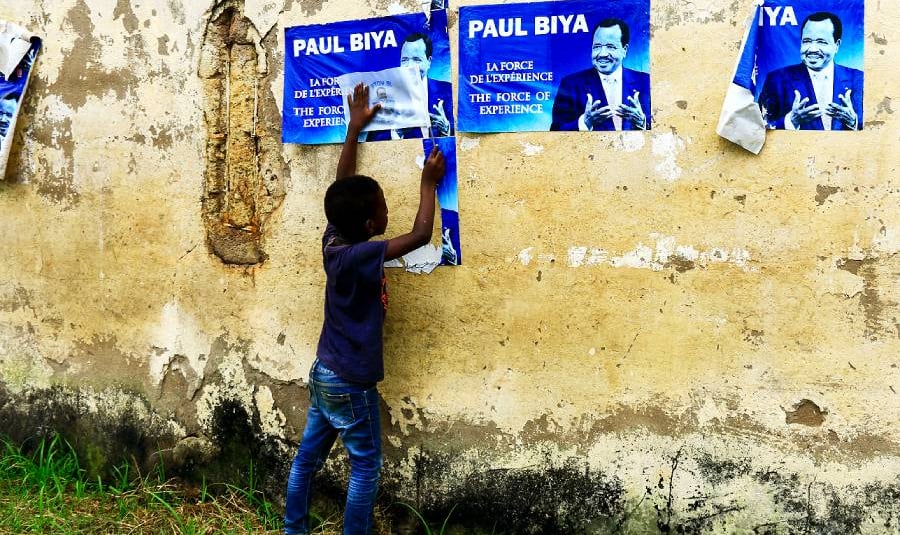Cameroon at a Crossroads: 2025 Election Amidst Regime Dominance and Escalating Crises
Farouk Hussein Abo Deif, Political Researcher, specializing in African affairs
6/28/20254 min read


Cameroon is hurtling towards a pivotal 2025 presidential election, but the nation is grappling with a perfect storm of political stagnation, escalating security crises, and severe economic hardship. At the center of it all is President Paul Biya. In power since 1982 and now Africa’s second-longest-serving leader, the 92-year-old is expected to seek an eighth term. His decades-long rule, cemented by a 2008 constitutional amendment that eliminated term limits, has created a system of entrenched authoritarianism.
But as Biya becomes less visible on the international stage, his frail health and the absence of a clear succession plan dominate the political discourse. This uncertainty has turned the upcoming election into a critical juncture that will determine whether Cameroon descends into deeper conflict or finds a path toward meaningful change. The stakes could not be higher.
A Nation on the Brink: The Four-Front Crisis
Cameroon's stability is being tested on all fronts. These are not isolated problems; they are deeply interconnected, creating a political tinderbox where a single spark could ignite a nationwide crisis.
1. The "Forever President" and a System Rigged Against Change
President Biya and his ruling Cameroon People's Democratic Movement (CPDM) have mastered the art of authoritarian survival. The political system is an "electoral autocracy," where the levers of power—from the courts to the electoral commission—are firmly controlled by the regime. Dissent is systematically suppressed, with opposition leaders and activists routinely jailed under vaguely worded anti-terrorism laws.
In a move widely seen as a masterstroke of political neutralization, the regime postponed legislative and local elections to 2026. This strategically hinders opposition candidates, many of whom must hold elected office to run for president, effectively clearing the field for Biya long before the race even begins.
2. Wars on Multiple Fronts
Cameroon is battling grave security threats that make the prospect of a safe and inclusive election nearly impossible in large parts of the country.
The Anglophone separatist conflict in the Northwest and Southwest regions has become a brutal war, displacing over 700,000 people and devastating communities.
In the north, the Boko Haram insurgency continues its campaign of terror against civilians.
The eastern border is strained by a refugee crisis flowing from the Central African Republic.
These overlapping conflicts have left over a million people internally displaced. For them, and for millions more living in insecure regions, participating in an election is a life-threatening risk.
3. Economic Hardship and Public Anger
Despite a projected 4.1% economic growth rate, the reality for ordinary Cameroonians is bleak. Forty percent of the population lives in poverty, and youth unemployment is critically high. Systemic corruption and soaring inflation fuel widespread public frustration, creating fertile ground for social unrest and amplifying calls for radical change. This deep-seated anger is a powerful undercurrent that the regime can no longer afford to ignore.
4. The Shadow of Foreign Influence
As Cameroon's future hangs in the balance, external powers are vying for influence. Russia, France, and China are all competing for a foothold through aid, infrastructure projects, and media campaigns. Russian-backed outlets, in particular, have been actively promoting pro-regime narratives, intensifying domestic polarization and undermining calls for a transparent, democratic process.
Five Scenarios for a High-Stakes Election
Given these volatile conditions, the 2025 election could unfold in several ways, each with profound implications for Cameroon's future.
Scenario 1: The Status Quo Prevails (For Now)
President Biya secures an eighth term in a non-competitive election marked by repression, low turnout, and an opposition boycott. This outcome would entrench authoritarianism and buy the elite time to manage a future succession, but it risks triggering widespread protests and international condemnation.
Scenario 2: The Legitimacy Crisis
Major opposition forces boycott the election, exposing it as a political charade. The result would be a ceremonial vote with a predetermined outcome, plunging the regime into a profound crisis of legitimacy, isolating it internationally, and inviting greater social unrest at home.
Scenario 3: The Electoral Collapse
Intensifying armed conflict and a harsh government crackdown prevent voting in large parts of the country. Widespread violence and attacks on polling stations could force a postponement of the election or trigger calls for robust international intervention to prevent state failure.
Scenario 4: The Sudden Power Vacuum
President Biya’s health fails before or shortly after the election, sparking a chaotic power struggle within the ruling elite. Without a clear successor, this scenario could lead to political turmoil, military intervention, or a complete breakdown of state authority.
Scenario 5: Cosmetic Reforms, Enduring Control
Facing international pressure, the regime implements superficial reforms—such as allowing token opposition participation or improving voter registration—to give the election a veneer of legitimacy. This would ease external criticism but fail to produce substantive change, ensuring the continuity of the authoritarian system under a new guise.
A Perilous Crossroads
After four decades under one ruler, Cameroon's state institutions have been captured, its democratic space has been decimated, and its people are caught in the crossfire of escalating crises. The mounting internal tensions pose a genuine and severe threat not only to the integrity of the 2025 election but to its very feasibility.
President Biya’s continued rule is no longer a guarantee of stability but is increasingly seen as a source of it. Cameroon’s future now depends on a genuine commitment to comprehensive reform—one that moves beyond facade elections and addresses the deep-rooted causes of this multifaceted crisis. The path chosen in 2025 will define the nation for a generation.
Download the full study here
Empowerment
Amplifying African voices for sustainable progress together.
Contact US
Growth
Street No. 3281, N'Djamena, Republic of Chad.
© 2024. All rights reserved.